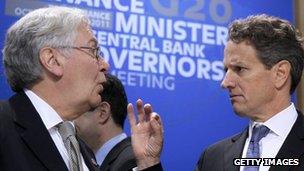Libor scandal: Bankers discussed concerns in 2008
- Published

Sir Mervyn King and Timothy Geithner met at a central bankers meeting in May 2008
Bank of England Governor Sir Mervyn King and US Treasury Secretary Timothy Geithner discussed concern about Libor interest rates as early as May 2008.
Mr Geithner, who headed the New York Federal Reserve at the time, called for procedures to prevent misreporting.
<link> <caption>The Bank of England said</caption> <url href="http://www.bankofengland.co.uk/publications/Pages/news/2012/068.aspx" platform="highweb"/> </link> concerns were widespread at the time, but they had seen no evidence of wrongdoing.
But separate documents released by the New York Fed indicate that the Americans did have some evidence.
Several banks are being investigated for allegedly manipulating Libor, the daily figure which reflects the amount that banks are charging to lend each other money, and which is the benchmark for trillions of dollars worth of financial transactions.
It stands for London Interbank Offered Rate, and is made up of banks' own estimates each day of their borrowing costs in various currencies and various fixed terms up to one year.
'Absolute rubbish'
<link> <caption>In one transcript of a telephone call from 11 April 2008</caption> <url href="http://www.newyorkfed.org/newsevents/news/markets/2012/libor/April_11_2008_transcript.pdf" platform="highweb"/> </link> released by the New York Fed on Friday, a Barclays employee told the New York Fed that Barclays was underreporting its rate to avoid the stigma associated with being an outlier with respect to its Libor submissions, relative to other participating banks.
<link> <caption>In a later telephone call, on 24 October 2008</caption> <url href="http://www.newyorkfed.org/newsevents/news/markets/2012/libor/October_24_2008_transcript.pdf" platform="highweb"/> </link> , a Barclays employee told a Fed official that the Libor rate was "absolute rubbish".
"Yesterday's ... it's a touch lower than yesterday's but please don't believe it. It's absolute rubbish," said the unnamed Barclays employee.
"I think the problem is that the market so desperately wants libors down it's actually putting wrong rates in," he went on to say, explaining that Barclays - and some of its peers - were under-reporting their rate to avoid being perceived as an outlier compared to other participating banks.
There was a great deal of concern, both within Barclays and the government, as to why Barclays' Libor submissions were higher than other banks at the height of the financial crisis at the end of 2008.
A higher submission rate might be interpreted by the market as a sign that Barclays was in particular trouble compared with other banks, and this created an incentive for Barclays to under-report its true cost of borrowing to the Libor committee.
Barclays' high Libor submissions had led some to suspect that - after the part-nationalisations of RBS, Lloyds and HBOS - Barclays would be next, deputy Bank of England governor Paul Tucker told MPs on the Treasury Committee earlier this month.
'Enhancing credibility'
In late April the New York Fed said it began seeking ways to deal with the "problems with Libor", <link> <caption>a statement said. </caption> <url href="http://www.newyorkfed.org/newsevents/news/markets/2012/Barclays_LIBOR_Matter.html" platform="highweb"/> </link>
It also met with officials from the British Bankers' Association (BBA), the UK banking lobby and which is in charge of Libor, to express concerns and "establish in greater depth the flaws in the Libor-setting process."
The BBA at the time was already aware of rate manipulation at Barclays, <link> <caption>according to the US Commodity Futures Trading Commission</caption> <url href="http://www.cftc.gov/ucm/groups/public/@lrenforcementactions/documents/legalpleading/enfbarclaysorder062712.pdf" platform="highweb"/> </link> , after a senior treasury manager at the bank informed the body that the bank was not "clean-clean".
It is yet unknown whether the BBA had notified the Bank of England, and if not, why.
The Bank of England said Sir Mervyn and Mr Geithner had met in May 2008 at a summit of central bankers in Basel.
Mr Geithner emailed Sir Mervyn on 1 June 2008 a set of recommendations for "enhancing the credibility of Libor", the Fed's statement said.
However, <link> <caption>the email does not specify evidence given by the Barclays employee</caption> <url href="http://www.newyorkfed.org/newsevents/news/markets/2012/libor/June_1_2008_LIBOR_recommendations.pdf" platform="highweb"/> </link> and it is unknown to what extent the Bank of England governor was aware of the wrongdoing.
The recommendations included one that would "eliminate the incentive to misreport", a document released by the Bank of England showed.
The New York Fed suggested that Libor figures should be published without identifying which banks had reported particularly high or low borrowing costs - something that might have taken the pressure off a bank in Barclay's position.
Sir Mervyn then responded Mr Geithner shortly afterwards, saying he had <link> <caption>passed the Fed's recommendations onto the BBA</caption> <url href="http://www.newyorkfed.org/newsevents/news/markets/2012/libor/June_3_2008_email_from_Mervyn_King.pdf" platform="highweb"/> </link> .
"As it is clear from the report... the New York Fed helped to identify problems related to Libor and press the relevant authorities in the UK to reform this London-based rate," said the Fed statement.
In his evidence session, Mr Tucker told MPs that he had personally rung the major banks, urging them to take seriously the review of Libor that the British Bankers' Association - which runs the system - was then carrying out.
Four months later, in October 2008, a senior Barclays executive - chief operating officer Jerry del Missier - instructed traders to keep Barclays' Libor submission rates low.
Barclays has agreed to pay a fine of £290m ($450m) to UK and US authorities for giving inaccurate figures and trying to manipulate Libor rates between 2005 and 2008, initially for profit, and around 2008 to reduce concerns about the extent of financial stress it was under.
Mr del Missier, who resigned from Barclays in the wake of the scandal, is due to face the Treasury Committee on Monday.